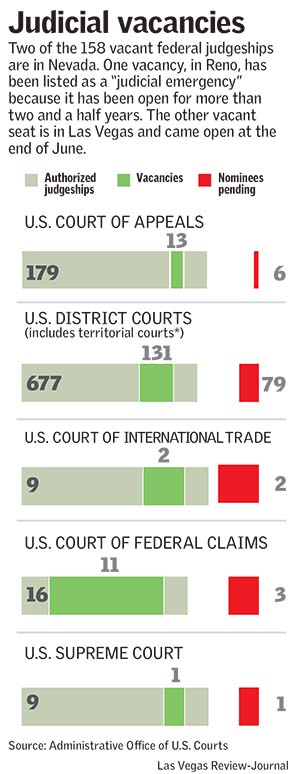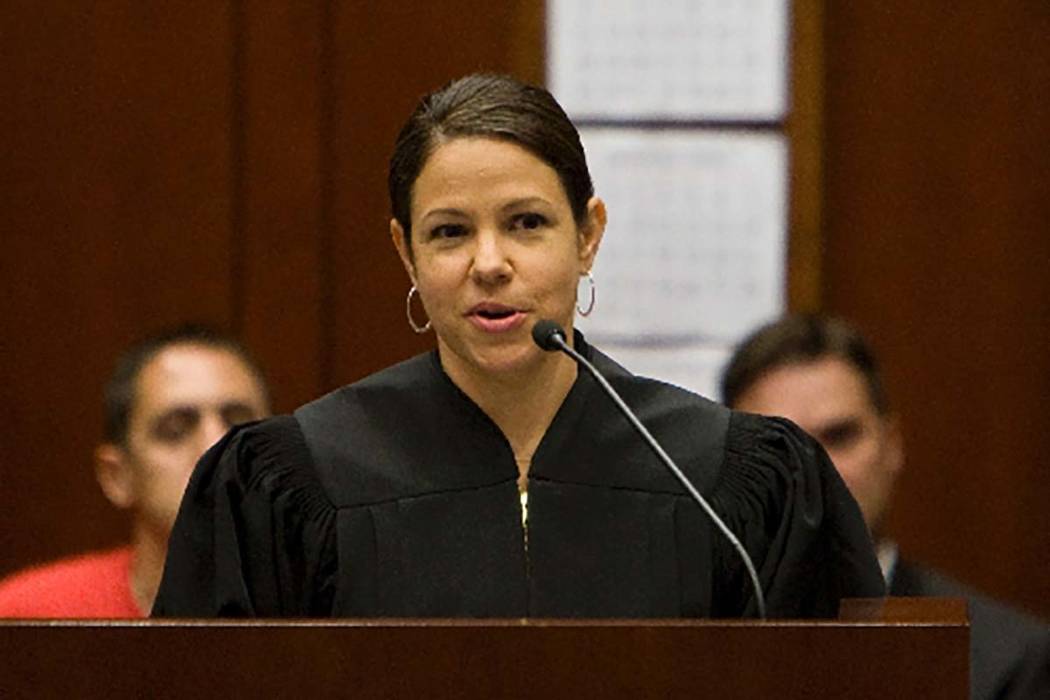Caseloads grow in Nevada, US as judicial vacancies unfilled
WASHINGTON — Senate Republicans are confirming President Donald Trump’s federal appellate judges at a fairly rapid clip, but vacancies in lower district courts remain unfilled, creating heavy workloads and delays for pending civil and criminal cases.
Nevada has two open seats that were vacated when judges took senior status. One seat, in Reno, has been listed as a “judicial emergency” by the Administrative Office of the U.S. Courts because it has been open for more than 2½ years.
The other Nevada seat is in Las Vegas and came open at the end of June. 
Chief U.S. District Judge Gloria Navarro in Las Vegas said the vacancies have “a huge impact, considering our caseload is going up and up and up.”
According to the Administrative Office of the U.S. Courts, the number of case filings in the Nevada district is higher than the national average for federal district courts. Nationwide, district court caseloads grew 6 percent last year alone.
The Judicial Conference of the United States recommended in March 2017 that Nevada receive an additional district judge, on top of its seven existing judgeships, due to the state’s high caseload.
In addition to a lack of judges on the bench, the vacancies represent a loss of staff who help manage cases, keep records and file reports.
“We need those positions filled,” Navarro said.
Vacancies nationwide
Nevada is not alone.
Nationally, there are 157 judicial vacancies with 90 nominees selected by President Donald Trump and awaiting Senate confirmation, according to Administrative Office of the U.S. Courts.
Sen. Dean Heller, R-Nev., submitted a list of candidates to the White House for consideration for Nevada’s vacancies, an aide said.
But Trump has not nominated anyone for the seats. He also has chosen to fill vacancies with jurists who were not recommended by their home state senators. A White House spokeswoman declined to comment on Nevada’s vacancies or nominations.
In an overview on the vacancies, the American Bar Association said the nation “is disadvantaged when our federal judiciary does not have sufficient judges to hear cases and resolve disputes in a thorough and timely fashion.”
Trump has appointed 44 federal judges since taking office. That includes Supreme Court Justice Neil Gorsuch and a record number of circuit court judges. Trump also has nominated Judge Brett Kavanaugh to fill a second Supreme Court vacancy. A Senate confirmation hearing on his nomination is expected next month.
Senate Majority Leader Mitch McConnell has touted the confirmation of 24 appellate judges, more than under other recent presidents during the same period of time. President George H.W. Bush saw 22 appellate judges confirmed in his first two years in office. Bill Clinton had 19, George W. Bush 17 and Barack Obama 16.
McConnell gets credit and blame
The record number of confirmations for Trump is attributable to McConnell, who has pushed nominations through the Senate. McConnell also was instrumental in the delay of judicial confirmations under Obama.
Following the death of Justice Antonin Scalia, McConnell blocked Obama’s Supreme Court nomination of Judge Merrick Garland and slowed other judicial confirmations.
When Trump took office, he inherited a Supreme Court vacancy, more than a dozen empty appellate court seats and over 80 unfilled federal district judgeships.
Although Senate Republicans and Trump have blamed Democrats for delaying his judicial nominees, McConnell shoulders responsibility for the large number of vacancies, said Carl Tobias, a former UNLV professor now with the University of Richmond School of Law.
In blocking Garland’s nomination, Republicans shut down the confirmation process in the last year of Obama’s term, approving only two appellate judges and failing to take action on district judicial nominations after they were moved forward by the Senate Judiciary Committee.
“That is why there was this huge number of vacancies when Trump came in,” Tobias said. “They have not been able to catch up.”
And while Republicans boast about the record number of appellate judges approved since Trump took office, Tobias said that has come at the expense of action on district court nominees.
McConnell plans to keep the Senate in session in August to confirm judicial and executive branch nominees, but whittling down the backlog will be difficult with Senate rules that allow votes on only several nominees a week. McConnell hopes to hold hearings on Kavanaugh’s nomination in September with a goal of having him confirmed before the Supreme Court returns to work Oct. 1.
Process hurts Nevada
The slow process hurts states like Nevada, where Navarro cites mortgage foreclosure and civil cases as the main reason for skyrocketing filings and full dockets.
The first vacancy in Nevada occurred Feb. 1, 2016, when Judge Robert C. Jones, appointed by President George W. Bush, took senior status.
Obama nominated Ann Rachel Traum on April 28, 2016, to fill the post, but her nomination was blocked by Heller as Republicans shut down the process following Scalia’s death and Garland’s nomination.
“She never got a hearing,” Tobias said.
Nevada’s second vacancy came June 29, when Judge James Mahan, nominated by George W. Bush and confirmed by the Senate in 2002, took senior status.
With seven permanent judges, the loss of two creates a problem managing a caseload that is higher than the national average for federal courts, Tobias said.
“It’s a real problem,” he said.
There are six vacancies and one announced departure on the 9th Circuit Court of Appeals. The six vacancies are all considered judicial emergencies.
The 9th Circuit, which includes Nevada, has 20 district court vacancies and one announced future vacancy. Trump has nominated seven candidates.
In California, where federal judges have ruled against the president on immigration policies and his travel ban, Trump has yet to nominate a candidate for nine vacancies.
Contact Gary Martin at gmartin@reviewjournal.com or 202-662-7390. Follow @garymartindc on Twitter.





















